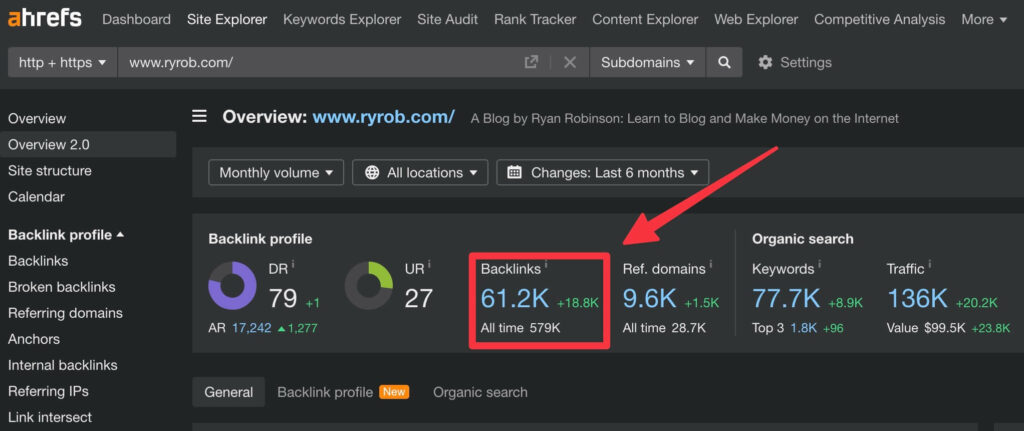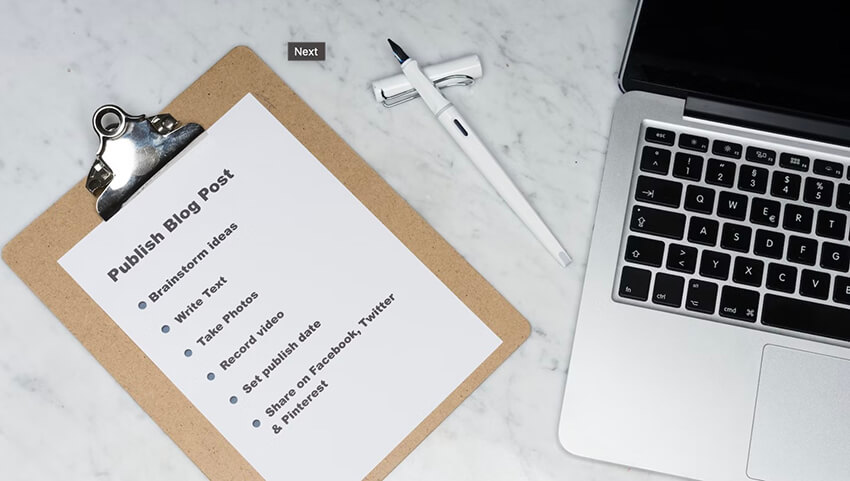Link building is hugely important for driving more traffic to your blog—so much so that it’s the main component of “off-page” SEO.
You might already be familiar with link building or have a hazy idea of what it means. You may also have come across the idea of “bad” backlinks to your blog and might be worried about how to avoid those.
So what exactly is link building, and how can you do it well?
The Blogger’s Guide to Link Building (How to Build Links & Relationships with Bloggers)
- What is Link Building for SEO?
- 6 Important Basics to Understand About Backlinks
- 6 Key Do’s and Don’ts of Link Building
- 7 Worthwhile Link Building Techniques & Ideas to Try for Growing Your Blog
Disclosure: Please note that some of the links below are affiliate links and at no additional cost to you, I’ll earn a commission. Know that I only recommend products and services I’ve personally used and stand behind. When you use one of my affiliate links, the company compensates me, which helps me run this blog and keep my in-depth content free of charge for readers (like you).
Want My Free Blog Business Plan Template?
Grab my free blog business plan template in both Google Doc and PDF format (that’s helped me build a six-figure blog) and reach 500,000+ monthly readers today.
"*" indicates required fields
What is Link Building for SEO?
Link building for SEO means proactively getting other websites to link to your website or blog. Link-building strategies include guest blogging, broken link building, directly asking for links, linking to your site from forums, Q&A sites, comments, and more.
Throughout my blogging career, I’ve attracted more than 61,200+ backlinks from a combination of natural (organic) link pickups & other more strategic methods for getting links:

There’s much to unpack there, especially if you’re new to blogging. So, let’s dig into some key terms: SEO and links.
What is SEO (Search Engine Optimization)?
SEO stands for Search Engine Optimization. It’s the practice of getting your website content to rank well in Google and other search engines. This includes on-page SEO (e.g., using appropriate keywords in your content), technical SEO (e.g., speeding up your website), and off-page SEO (link building).
When someone runs a Google search, they’ll see a search engine results page (SERP) listing the pages that Google thinks are the best match for that search. SEO aims to get your content to rank higher on that results page.
What are Links?
Links, or hyperlinks, are HTML elements that link from one webpage to another (or, less often, to other parts of the same page). They’re all over the web: the web as we know it wouldn’t exist without these links. Links appear in navigation menus, sidebars, and within blog content.
You’ll hear a few different terms used about links:
- Backlinks: links from other websites to your site (or to a competitor’s site that you’re examining). They’re sometimes called inbound links instead.
- Internal links: links from one page on your site to another page on your site.
- External links: links from your site to someone else’s site. They’re sometimes called outbound links instead.
Traditionally, links are blue and underlined, but a different color might indicate them and may not have an underline.
Here’s an example of a link to my guide on starting a blog.
Here’s how that sentence looks in HTML code:
Here’s an example of a link to <a href=”https://www.ryrob.com/how-start-blog/”>my guide on starting a blog</a>.
Why is Link Building Important?
Link building is important because each link to a page on your website acts like a vote for it. The more links you have from other sites, the more Google will know that your site is well-known and respected. So, link building works to win higher rankings for your content in Google’s search results.
This is why some links are more valuable than others. If a high authority website that’s been around for years links to yours, their “vote” is a much bigger ranking factor than a link from a tiny, unknown blog that only launched last week.
Over time, your blog will naturally gain links “organically”—that means people link to you without you doing anything to get those links. But some people who enjoy your blog won’t ever think of linking to it without any prompting.
It’s important to note, however, that Google’s spam policies technically advise against link building efforts. But I’ll be honest with you—literally every successful blogger, influencer, website, software company, and publication invests massive amounts of time and resources into the strategic, smart, and safe link building strategies we’ll explore later in this guide.
6 Important Basics to Understand About Backlinks

Before we discuss all the details of SEO link building, let’s first establish some crucial basics.
1. Links Can Be “Follow” or “Nofollow”
By default, all links on the web are “follow” or “dofollow” links—regular links with no “rel” tag.
But in recent years, links have become increasingly common to be “nofollow.” This means that a special tag is added to the HTML code for the link, like this:
<a href=”https://www.ryrob.com/how-start-blog/” rel=”nofollow”>my guide on starting a blog</a>.
As Google explains, the nofollow attribute should be used when “you want to link to a page but don’t want to imply any type of endorsement, including passing along ranking credit to another page.”
Simply put, this means that if you’re building backlinks, you ideally want “follow” links. If a link has the “nofollow” tag, it won’t have much direct SEO benefit for you.
However, some SEO experts believe that nofollow links still have some effect (just not as much) and that having several nofollow backlinks helps you have a more natural backlink profile in Google’s eyes.
2. Your Anchor Text Matters
Anchor text is the word, phrase, or sentence to which your link is attached (or “anchored”). For instance, here’s a link to my post on how to name a blog. As you can see, the anchor text there is “how to name a blog”.
When other people link to your blog, they’ll usually choose the anchor text. That’s fine: in most cases, they’ll choose something logical related to your page’s topic (which is helpful for Google).
If you get to choose your anchor text, perhaps in a guest post bio, it’s best practice to:
- Choose anchor text that describes the page. Don’t use “click here to find out more;” instead, try something like “check out my blogging tips on RyRob.com.”
- Vary the anchor text you use. Don’t always use the same words or phrases to link to a particular page: this looks like an unnatural backlink profile to Google.
3. Search Engines Want to See a “Natural” Backlink Profile
I’ve mentioned “natural” and “unnatural” backlink profiles several times—so what exactly does that mean?
Google doesn’t want bloggers to engage in shady practices like buying backlinks or carrying out link exchanges (because those links aren’t earned). These are sometimes called “black hat” SEO (vs. “white hat” SEO, where bloggers are earning links ethically).
A “natural” backlink profile includes lots of different links from different sites across a period. Those links shouldn’t just come from huge, high-profile sites but from blogs and social media platforms like LinkedIn, Twitter, Facebook, Pinterest, niche sites, etc.
An “unnatural” backlink profile might only include backlinks from massive sites or have many links in a very short period.
In general, when building backlinks, use various methods and techniques that help you naturally attract links (like creating amazing content). Don’t pay for links—Google has algorithms to detect this, and they may well penalize you.
4. Some Links Will Be Naturally Lost Over Time
One of the frustrating things about building backlinks is that you might put in a ton of hard work… only to find that your backlinks have vanished.
This is just the nature of the internet. Some bloggers give up on blogging—and once their site vanishes, so do the backlinks that you previously had from them. Other bloggers might delete content that’s no longer on-brand or relevant for them—meaning you lose any backlinks from that content.
Backlinks can even be “poached” from you by other sites. If they have a better resource than yours, they might ask sites to link to them instead. (Don’t worry—you can use this technique too.)
It’s completely normal to lose some backlinks over time, so you should view backlink building as an ongoing process—not something you do once and then forget about. Just be sure to stay on top of your best backlinks and launch a link reclamation campaign a couple of times a year.
5. You’ll Win Some Backlinks Effortlessly (Especially as Your Blog Grows)
You don’t have to work for every single backlink. You’ll win some backlinks without doing anything at all, which will become more frequent as your blog grows.
Some of your blog’s readers may have blogs of their own, and they may link to a piece you wrote that they loved. Other bloggers in your niche may come across your content and link to it or quote from it to add extra depth to one of their posts. Someone who stumbles across your blog might link to your content from their post on an online forum. And so on.
The bigger your blog and the more content marketing you do, the higher the chances that you’ll get these effortless (and natural) backlinks.
6. Backlinks Bring Referral Traffic and Grow Brand Recognition Too
Backlinks aren’t just good for helping you get more organic traffic from search engines. They also grow your referral traffic—visitors who come to your site by clicking the link on another blog or website. While this may be a small proportion of your overall traffic, people who visit because they enjoyed your guest post or read about your blog are likely to stick around.
Even if people see your link on another blog and don’t click on it, they may remember your blog’s name. The more you appear on other blogs and websites, the more your brand will be recognized. This helps grow your reputation in your blogging niche: you’ll become one of the bloggers everyone seems to be talking about.
6 Key Do’s and Don’ts of Link Building

We’re going to run through key link building techniques in a moment—but before we get to that, let’s look at some important do’s and don’ts.
1. Do Make Sure Your Blog is Worth Linking To
If your blog is brand new, with a single post, a generic WordPress theme, and a “coming soon” message on your About page, it does not look very impressive to established bloggers.
Wait until more content is published before you start link building (or, indeed, any digital marketing). You might also want to invest in a premium WordPress theme and a custom logo to help your blog make a great first impression.
2. Don’t Pay for Backlinks or Join in Link Exchanges
Google is not keen on bloggers paying for links. If you pay someone to link to your blog (e.g., from an ad), that link should be “nofollow.” Paying for regular “follow” links could penalize your blog by Google.
You should also avoid link exchanges (reciprocal links). This is where a blogger promises to link to your blog in exchange for you linking to theirs. It’s okay if you’re linking to a blog that would naturally link to you, too (e.g., if you guest post for one another), but you shouldn’t deliberately seek out reciprocal links.
3. Do Aim for High-Quality Backlinks from Reputable Sites
Not all links are created equal. Google knows that some websites are much more reputable than others. When building links, you want to ideally gain links from high-quality sites—like big-name blogs in your niche.
Of course, it’s fine to have links from much smaller, less-established sites too. But it’s best to focus your link building efforts on high-authority blogs and sites where possible. To find the best sites, check each site’s PageRank (out of 10). Anything over 4 is good: the higher, the better. (3 is average.) You can also check out the Moz domain authority (out of 100).
4. Don’t Pester Bloggers for Links (Prioritize Relationships)
If you had a peek at my inbox, you’d see that I get a lot of link requests. (If your blog has been around for a while, you might get a few of those requests, too.)
It’s okay to ask for a link … but carefully prioritize your relationships with other bloggers. Don’t ask repeatedly—especially if this is the first time you’ve been in touch with the blogger. If they don’t reply, assume it’s a “no.”
5. Do Build Backlinks to Multiple Pages on Your Site
Some bloggers only think about building backlinks to their homepage or perhaps to a key landing page or piece of pillar content. However, building backlinks to many different pages on your site is important.
This helps create a more natural backlink profile and helps you get multiple pages ranking well in Google.
6. Don’t Spam Comments Sections to Get Links—It Won’t Work
One popular old-school link building technique was to leave blog comments everywhere. There’s nothing wrong with commenting on blogs, but if you’re only commenting to put in a link to your post, stop.
Links in comments are almost always nofollowed, so they won’t do much for your SEO. Plus, many blogs automatically send comments to moderation if they contain a link—so your comment might never get published at all.
7 Genius Link Building Techniques & Ideas to Try for Growing Your Blog

So, how exactly do you build links to help grow your blog? There are plenty of different techniques to try, whether you’ve just started a blog for the first time or you’re a seasoned blogger. I will run through some of the most popular and most effective link building tactics, with tips to help you get the most from each as you start your link-building campaign.
1. Guest Post for Big Blogs in Your Niche
Guest blogging is a fantastic way to grow your blog and your profile in your niche. As a guest blogger, you write a (usually free) guest post for someone else’s blog. They publish it with your name and bio on it.
In your guest post bio, you can normally link to anything you want—and it often makes good sense to link to a post on your blog related to what you’re posting about. That way, you’ll get the SEO benefits and hopefully get some highly targeted traffic from interested readers clicking through to read more of your content.
Guest Posting Tips
- Tailor your ideas to the blog you’re writing for. Look at the type of posts they normally publish and come up with several potential ideas that would be a good fit. Pitch several ideas at once so the blog owner can choose the one they like best.
- If the host blog allows it, include a highly relevant link in your post to a high-quality piece on your own blog. (This is in addition to your bio link.) Make sure your linked page is adding value to your guest post.
2. Try Broken Link Building (Dead Link Building)
Broken link building is a clever technique for looking for links that no longer work. For instance, perhaps a blogger in your niche wrote a piece several years ago that linked to a resource on “small business ideas”. But that resource no longer exists online—and the link is broken.
If you have a post on “small business ideas,” then you can email the blogger, let them know about the broken link, and politely suggest your own resource as an alternative.
Broken Link Building Tips
- Use a link building tool like Ahrefs Broken Link Checker or similar tools inside SEMRush to check for broken links on any website. See if you have a resource that could be linked to in place of any of the broken links. You’ll get to see other key website metrics at the same time.
- Check out the broken (dead) link using the Wayback Machine. That way, you can see what the previous resource looked like and check that yours is up to the same standard (or, hopefully, even better).
3. Become a Help a B2B Writer & HARO Source
While HARO (which stands for Help a Reporter Out) is the OG in this arena, its quality has gone down a bit over time. It’s a massive mailing list where journalists, bloggers, and anyone else looking for a source can put out a request. Sources—that’s you!—write a response and, generally, get a link back to their website. However, it’s also flooded with low quality requests, IMO.
Help a B2B Writer, now run by the wonderful Jimmy Daly of Superpath, is the gold standard in raising your hand as a trusted source within your niche. They get the highest quality writers & publications frequenting their platform, looking for expert quotes, advice, inspiration, and everything in between.
To get involved, you must sign up for these mailing lists and select the checkboxes to say which subjects you have expertise in.
Help a B2B Writer & HARO Tips
- You can quickly get a lot of emails from these platforms, so it’s a good idea to set up a separate folder in your email account to help you keep track of these.
- Set aside time each day to skim through the Help a B2B Writer & HARO emails and compose replies. It pays to be fairly quick off the bat, as many journalists or bloggers will be on a tight deadline.
4. Reach Out Directly to Bloggers (Respectfully)
You can email key influencers in your niche to ask for a link … but as I mentioned above, don’t pester anyone. Be polite and respectful when you email—and don’t try to “trick” bloggers with an unclear subject line.
Focus on bloggers who you already know (even if only through reading their blogs regularly) and make sure your content is 100% relevant to them.
Blogger Email Outreach Tips
- Take a look at my guide to blogger outreach—particularly the screenshots showing the terrible emails I get from people asking to guest post on my site. These are a great guide to what not to do. 😉
- Consider making it an easier “yes” by creating quality content that involves the blogger. For instance, you might review a book they’ve written, ask them to take part in an expert roundup, or even publish case studies using their products. They’ll be more likely to link to that than to some random post on your site.
5. Follow Up Mentions That Don’t Link to You
As you grow your blog and brand, you might find that other bloggers mention you—without linking to you. For instance, someone might write about hearing you speak at an event, or maybe they’ll mention that they listen to your podcast.
When you see your name mentioned without a link, drop that blogger a message or email to (a) say thanks for mentioning you and (b) politely ask if they could link to your blog as well. This same principle applies to link reclamation if you once had a backlink from a website and it’s since disappeared.
Unlinked Mentions Tips
- Use Google Alerts to track mentions of your name and of your blog’s name in new content. (You can also use this for your products, e.g., if you run an eCommerce site.) See my guide to using Google alerts for more.
- Look for unlinked past mentions—you might find you’ve been talked about more than you realize!
6. Ask for Your Content to Be Linked To Instead of an Inferior Piece
This technique is a little like broken link building… only you’re taking over a link that isn’t dead. Sometimes, a blogger or webmaster may have linked to a poor-quality piece of content because they were in a rush (or nothing better was available then).
Your job is to ask the blogger if they’ll link to your resource instead. Remember that they may feel happy with the original link or may not want to change it, so don’t be pushy if they say “no.”
Taking Over Links Tips
- Only ask for a link to be changed to your resource where your resource does the same thing (only better). A blogger linking to “best side hustle ideas” probably won’t be so keen on linking to a post of “businesses you can start in college.” It’s similar, but not the same. Similarly, if they’re linking to a template, they may not want a step-by-step guide.
- It sounds obvious, but do make sure that your content is significantly better than the piece that’s currently being used. You want to only offer great content that would make the best link in this context. Think about ways you can create 10x content through assets like infographics, free tools, a resources page, YouTube video tutorials and other more unique content types that site owners will actually be excited about.
7. Build Links Through Forums, Q&A Sites, Resource Pages, and Blog Comments
One final technique is to build links through online forums, Q&A sites (like Quora), and even blog comments. In all these cases, it’s really important not to spam. Focus on contributing useful content to the platform first, and include a link to a high-quality related post on your blog.
Links from these sources won’t boost your SEO, but they help fill out a natural link profile. You may also want to look into reputable online directories, which can be helpful for local businesses in particular.
Forums, Q&A, and Comments Tips
- Don’t spend huge blocks of time on this technique. You can do it little and often rather than creating loads of posts all at once.
- Check community rules about links, e.g., with online forums. Make use of your signature if you’re allowed to do so. On blogs, fill in your name and URL when commenting, and your name will become a link to your blog.
Final Takeaways: Get Started With Link Building (and Watch Your Traffic Grow)
Link building is a huge part of SEO. You could do everything right on your blog itself, but if no other blogs or websites link to you, Google simply won’t know how great your content is.
Most blogs will naturally attract at least a few links over time… but there’s a lot you can do to help speed things up so your blog can rise through the search engine rankings. By following my link building tactics above, you’ll be able to build natural, high-quality links to your site, while also building solid relationships with other bloggers in your niche.
And because AI tools can help save significant amounts of time in blogging today, check out all of my top free blogging tools (many of which are AI blogging tools) & guides:
- Free AI Article Writer Tool (AI-Powered) SEO Blog Posts
- Free Blog Idea Generator Tool to Get Unlimited Blog Ideas
- Free AI-Powered Blog Title Generator for Creative Headline Ideas
- Free Keyword Research Tool for Bloggers, Writers & Content Marketers
- Free AI Paragraph Rewriter Tool (to Reword Your Paragraphs)
- Meta Description Generator to Write Smart SEO Descriptions
- AI Blogging Guide: How to Use AI for Your Blog (Thoughtfully)
- 16 Best AI Blogging Tools to Use This Year
- 14 Best AI SEO Tools for Bloggers to Get More Search Traffic
To make sure your content has a great chance of ranking once it’s gained some links, check out my list of 10 on-page SEO strategies for bloggers and my round-up of the best free SEO tools.
Want My Free Blog Business Plan Template?
Grab my free blog business plan template in both Google Doc and PDF format (that’s helped me build a six-figure blog) and reach 500,000+ monthly readers today.
"*" indicates required fields

Just awesome. What an article it is! Thanks a lot for providing such helpful article.
I think your blog is very informative content. I like the way that you break down complex topics into easy to understand language. You also have a great layout and design. I’m sure other readers will appreciate your work as well. Keep up the great work!
Hi mr Ryan Rabinson thanks to meet you.
I am Rocks Ross Julius pastor, I am A True Gospel music preacher every day. Ok now kindly I am requesting you to stand with me in terms of financial services.
For sure Mr Ryan I appreciate the work that you are doing to teach people how to work through online, but me I have challenge how to start.
This article provides a helpful overview of link building strategies. The practical tips and explanations make it easier to grasp the concepts. It’s a useful resource for anyone looking to improve their website’s SEO. Thanks for sharing this information. Are there any additional resources or tools you would recommend for someone diving into link building?
Thanks for the article! Was helpful learning these link building tips.
Cool guide for those who just entered SEO. I am the one of them. Thanks!
Great post! Link building is definitely a critical element of off-page SEO, and it’s always interesting to dive deeper into the importance of acquiring high-quality backlinks. You’re right—understanding the difference between “good” and “bad” backlinks is crucial for avoiding penalties and boosting traffic. It’s not just about the number of links, but the quality and relevance. Thanks for shedding light on this – it’s a reminder that a smart, strategic approach to link building will always yield better results!